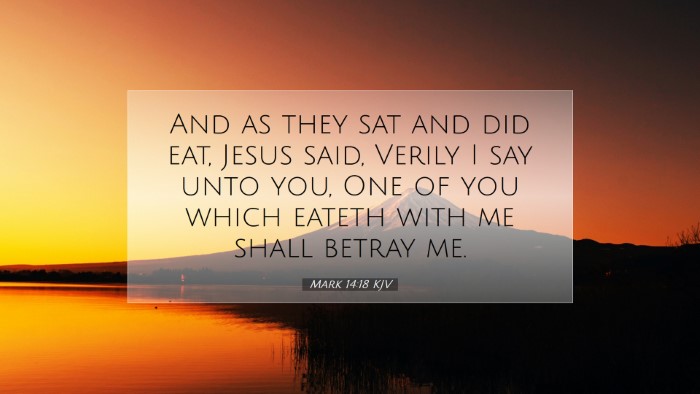Commentary on Mark 14:18
Overview
Mark 14:18 states, "And as they sat and did eat, Jesus said, Verily I say unto you, One of you which eateth with me shall betray me." This verse is situated in the context of the Last Supper, where pivotal events unfold leading to the crucifixion of Christ. This commentary integrates insights from notable public domain commentators including Matthew Henry, Albert Barnes, and Adam Clarke.
Contextual Analysis
Setting of the Last Supper
Before delving into the specific verse, it is crucial to understand the setting. The Last Supper was a moment of significant depth and gravity, marking the culmination of Jesus’ earthly ministry and foreshadowing His impending sacrifice. The disciples gathered with Him in an atmosphere laden with anticipation and foreboding.
Verse Breakdown
This verse consists of several impactful elements worthy of exploration:
- “As they sat and did eat” - This phrase emphasizes the communal aspect of the meal, highlighting fellowship and intimacy. Matthew Henry notes that this setting underscores the relational dynamics among Jesus and His disciples.
- “Jesus said” - The authority of Jesus in this moment is significant. His prophetic declaration not only identifies the imminent betrayal but also reflects His divine foreknowledge. Adam Clarke offers an observation regarding the weight of Jesus' words, suggesting that they carry an ominous significance.
- “Verily I say unto you” - The use of "verily" (or "truly") indicates the seriousness of what follows and emphasizes Jesus’ role as a prophet and teacher. Albert Barnes explains that this phrase serves to fortify the truth being proclaimed, marking it as a revelation of grave importance.
- “One of you which eateth with me shall betray me” - Here lies the crux of the statement. The implications of betrayal are profound; Jesus specifies that it will be one from among the chosen circle of disciples. Henry discusses the dual nature of fellowship and betrayal, suggesting that the betrayal is made all the more poignant by its intimate context.
Theological Implications
This verse opens up several avenues for theological reflection:
- The Nature of Betrayal - The idea that betrayal comes from within one’s closest circle invites reflection on human nature and the potential for such treachery in every heart. Adam Clarke remarks on the universality of sin, challenging believers to consider their own faithfulness.
- Jesus’ Foreknowledge - Jesus’ knowledge of His betrayal reveals His divine attribute—omniscience. This serves as a reminder of God's sovereignty even in the face of human volition. Barnes points out that this foreknowledge did not negate Judas' responsibility; rather, it highlights the tragic dimensions of his choice.
- Intimacy and Sin - The juxtaposition of communal eating with the act of betrayal underscores the painful reality that sin often exists in unsuspected places. Henry reflects on the nature of such relationships, emphasizing that those closest to us may harbor intentions contrary to love and loyalty.
Pastoral Applications
For pastors and church leaders, this verse serves as a poignant reminder of the following:
- Guarding Against Betrayal - It highlights the need for vigilance within the church community. Pastoral care must emphasize accountability and the safety of authentic relationships among members.
- Understanding Forgiveness - Like Jesus offering bread to Judas, pastors are called to exemplify grace even amidst deception and betrayal. This resonates deeply in the context of church dynamics and personal relationships.
- Encouragement to Remain Faithful - The context of betrayal reminds believers to remain steadfast amidst challenges, encouraging them to reflect on their commitments to Christ and one another.
Conclusion
Mark 14:18 encapsulates a profound moment in the narrative of Jesus’ life, revealing the dynamics of betrayal, community, and divine foreknowledge. The insights gleaned from the commentaries of Henry, Barnes, and Clarke provide a rich tapestry of understanding that is relevant for pastors, theologians, and students alike. Studying this verse encourages a deeper exploration of trust, the seriousness of sin, and the call to faithfulness in the face of human frailty.


